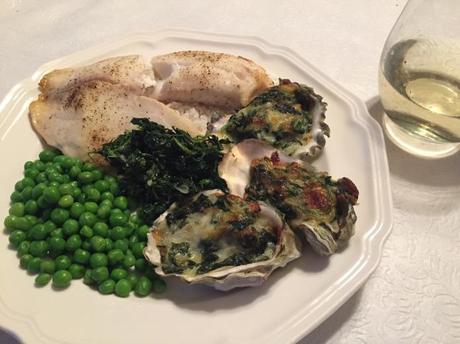Speaking of ritzy, on to oysters...
The world is your oyster.
Nowadays that basically means you have the ability and the freedom to do anything or go anywhere. Ever wonder where that saying came from?
It's an idiom from The Merry Wives of Windsor (1600) by William Shakespeare:
Falstaff: "I will not lend thee a penny"
Pistol: "Why then the world's mine oyster/Which I with sword will open."
One theory is that the phrase initially related to wealth, but now means all life's richness with the pearl in the oyster signifying this. Not exactly how we use it now but I thought it was neat to see where it came from.
Oysters: More Than Just Slimy Aphrodisiacs
Not only do they signify empowerment, freedom and choice, oysters happen to be one of the most nutrient dense "superfoods" on the planet. Fresh off talk of brain health food, of which oysters were mentioned a couple times, I though it would be fitting to give the quick low down on these little sea creatures. Yes, they look and (can) taste a bit slimy but when you get to know them you'll hopefully see they can be worth having around.
First off, a few years ago I would have never touched one. My wife was right there with me. Now, although I still haven't gotten her into sardines, she's right there on board with the greatness of oysters. The key for us was to get in the shallow end and not go straight to plain, raw oysters. It's probably good for you to keep it simple but I would rather eat oysters with some butter, garlic and cheese than not eat them at all. Why? Because they are a pretty remarkable food that packs a big nourishing punch. Here's why I decided to add oysters to my diet whenever I can...
They are big time aphrodisiacs.
Thanks for reading, have a great day!
Just kidding, there's more (although there really shouldn't need to be... says the guy with 4 kids who only started discovering the magic of oysters a couple years ago).
Super O'sOysters are a number of different families of saltwater clams, bivalve molluscs that live in marine or brackish habitats. Although we aren't sure who first discovered they were edible, we know people have been eating them for a long time. Oysters, along with other clams, have been considered highly valuable for a number of reasons (i.e. pearls and/or highly nutritious whole seafood) but they are also easy to prepare/flavor and have a nice ecological impact.
Sea based whole food
This is something we can all use a bit more of. If nothing else, being able to eat a whole food from the ocean is important for me. Sardines and anchovies are great but the addition of oysters, clams and scallops are a missing link that many of our diets could use. I still highly encourage eating any and all seafood, such as fish (salmon, trout, mackerel, tuna), crustaceans (crab, lobster, shrimp) and squid/octopus, but the problem with many of these is that we just eat the flesh. Similar to chicken, meat, turkey and pork, eating a fish filet or crab meat is just eating the muscle meat without the balance of the other parts of the animal. Just as I encourage more complete land mammal consumption, the more whole seafood you can eat the more balanced your diet can be.
Nutrient Density
Oysters are low in food energy (about 10 calories each) but an excellent source of zinc, iron, calcium, selenium, vitamin A and vitamin B12, all of which tend to be low in the average diet. Their rich amino acid content is also what is believed to trigger increased levels of sex hormones and the high zinc content aids the production of testosterone. Maybe there is a little something to the aphrodisiac angle after all.
Versatility
Pretty easy to prepare, they can be eaten raw or can be topped with any number of sauces or food combinations. I prefer mine steamed, boiled or roasted, the more traditional ways, but you can also grill or fry them. The cool thing is that if you want to mildly step into eating oysters, there's a number of ways you can do it where you don't really notice the texture or taste of the actual oyster. Is that wrong? Not if you ask me. Getting the nutritious whole seafood is what matters to me. One of my favorite preparations is Rockefeller style, which includes spinach sautéed in garlic and butter with some cheese melted into the mix. Spoon that onto a cooked oyster and you'll just likely be changing how you look at oysters.
Here's the recipe for Rockin' Oysters Rockefeller we made at home the other day.
Ecologically Friendly
Through a number of different filtering and nutrient cycling, oysters help balance their habitats and ecosystem. They are actually being farmed for this reason and may be one of the few foods that farming can actually be desirable. We need to see how this aspect plays out but there may be some promise.
So there's why I like oysters and eat them whenever I get a chance. Let me know if you have any favorite recipes because after finding out how simple they are to cook at home we will be expanding our oyster horizons even more. :)
Thanks for reading, have a great day!


